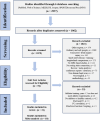A systematic review and coordinate-based meta-analysis of resting-state fMRI in athletes from open and closed skills sports
- PMID: 40596321
- PMCID: PMC12214797
- DOI: 10.1038/s41598-025-07192-2
A systematic review and coordinate-based meta-analysis of resting-state fMRI in athletes from open and closed skills sports
Abstract
The impact of prolonged sports training on athletes' brain functional activity remains inconclusive. A systematic review and coordinate-based meta-analysis of resting-state functional magnetic resonance imaging (rs-MRI) is necessary to identify functional connectivity changes induced by prolonged sports training. A total of 31 studies were included in the systematic review, and 18 studies with 347 non-athletes and 327 athletes were analyzed using coordinate-based activation likelihood estimation (ALE) and seed-based d mapping with permutation of subject images (SDM-PSI) meta-analysis. Results revealed that greater functional connectivity in athletes in the paracentral lobule, medial frontal gyrus, precuneus, inferior parietal lobule, supramarginal gyrus, inferior frontal gyrus, Rolandic operculum, and median cingulate/paracingulate gyri (DCG). Consistent changes in the DCG were identified in closed-skill sports athletes. Furthermore, increased regional functional activity was observed in the posterior cingulate gyrus, lingual gyrus and cerebellum. Both meta-analytical methods emphasize altered functional activity within the default mode network (DMN), cerebellar network (CBN), ventral attention network (VAN), visual network (VA), and sensorimotor network (SMN). These findings suggest that long-term sport training optimizes connection strength and efficiency in brain regions associated with visual attention, cognitive and motor control in athletes. Overall, our study reveals shared neural adaptations across different types of athletes, offering new insights into the effects of long-term specific training on brain functional connectivity in specialists.
Keywords: Activation likelihood estimation; Athletes; Functional connectivity; Meta-analysis; Resting-state functional magnetic resonance imaging; Seed-based d mapping.
© 2025. The Author(s).
Conflict of interest statement
Declarations. Competing interests: The authors declare no competing interests.
Figures




Similar articles
-
Progressive brain function changes in patients with neuromyelitis optica: insights from resting-state fMRI.Brain Imaging Behav. 2025 Aug;19(4):856-864. doi: 10.1007/s11682-025-01012-x. Epub 2025 May 23. Brain Imaging Behav. 2025. PMID: 40410634
-
Exploring the Effects of Action Observation Therapy on Swallowing Disorders in Stroke: A Functional Connectivity-Based fMRI Study.Neural Plast. 2025 Mar 31;2025:8176431. doi: 10.1155/np/8176431. eCollection 2025. Neural Plast. 2025. PMID: 40201620 Free PMC article.
-
Evidence of functional abnormalities in the default mode network in bipolar depression: A coordinate-based activation likelihood estimation meta-analysis.J Affect Disord. 2023 Apr 1;326:96-104. doi: 10.1016/j.jad.2023.01.088. Epub 2023 Jan 27. J Affect Disord. 2023. PMID: 36717032
-
Morphological and regional spontaneous functional aberrations in the brain associated with Crohn's disease: a systematic review and coordinate-based meta-analyses.Cereb Cortex. 2024 Apr 1;34(4):bhae116. doi: 10.1093/cercor/bhae116. Cereb Cortex. 2024. PMID: 38566507
-
The unique characteristics of extraversion: A systematic review and coordinate-based meta-analysis of resting state functional magnetic resonance imaging studies.Brain Res Bull. 2025 Sep;229:111454. doi: 10.1016/j.brainresbull.2025.111454. Epub 2025 Jul 1. Brain Res Bull. 2025. PMID: 40609701
References
-
- Gabbett, T., Jenkins, D. & Abernethy, B. Game-based training for improving skill and physical fitness in team sport athletes. Int. J. Sports Sci. Coach.4, 273–283. 10.1260/174795409788549553 (2009).
-
- DeCouto, B. S., Bilalic, M. & Williams, A. M. Neuroimaging and perceptual-cognitive expertise in sport: A narrative review of research and future directions. Neuropsychologia205, 109032. 10.1016/j.neuropsychologia.2024.109032 (2024). - PubMed
-
- Cantou, P., Platel, H., Desgranges, B. & Groussard, M. How motor, cognitive and musical expertise shapes the brain: Focus on fMRI and EEG resting-state functional connectivity. J. Chem. Neuroanat.89, 60–68. 10.1016/j.jchemneu.2017.08.003 (2018). - PubMed
-
- Kalen, A. et al. The role of domain-specific and domain-general cognitive functions and skills in sports performance: A meta-analysis. Psychol. Bull.147, 1290–1308. 10.1037/bul0000355 (2021). - PubMed
Publication types
MeSH terms
Grants and funding
LinkOut - more resources
Full Text Sources
Medical

